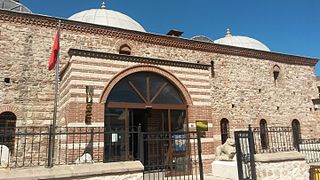 | |
 | |
| Established | 1973 |
|---|---|
| Location | Taşucu yolu, Silifke, |
| Type | Archaeology, ethnography |
| Director | İlhame Öztürk |
Silifke Museum is in Silifke district of Mersin Province, Turkey.
 | |
 | |
| Established | 1973 |
|---|---|
| Location | Taşucu yolu, Silifke, |
| Type | Archaeology, ethnography |
| Director | İlhame Öztürk |
Silifke Museum is in Silifke district of Mersin Province, Turkey.
The first museology activity in Silifke dates back to 1939. The findings in Silifke district which is rich in archaeological wealth were collected in a former primary school building which itself is older than a century. After the museum building was constructed the museum was opened to public on 2 August 1973.
In the yard of the museum stonemasonry items are displayed including various types of column headings, sarcophaguses, Moslem tombstones etc. The building has four showrooms. In the showroom in the groundfloor there are various sculptures. The first room of the first floor is dedicated to ethnographic items mostly on Yörük life. In the other two rooms, handicrafts and ornaments are displayed. The Luvian Hellenistic coins of ca. 5th century BC, found in Meydancık Castle about 80 kilometres (50 mi) west of Silifke are also displayed in Silifke museum. [1]
Earlier works are from the Neolithic age. Hellenistic, Roman, Byzantine, Seljuk and Ottoman works are also displayed. [1]

The Hatay Archaeology Museum is the archaeology museum of Antakya, Turkey. It is known for its extensive collection of Roman and Byzantine Era mosaics. The museum is located in Antakya, the main city of Hatay. Construction of the museum started in 1934 on the recommendation of the French archaeologist and antiquities inspector Claude M. Prost. It was completed in 1938 and came under Turkish control in 1939 following Hatay's unification with Turkey. The museum was opened to the public in 1948 and re-opened in 1975 following renovation and expansion.

The History Museum of Armenia is a museum in Armenia with departments of Archaeology, Numismatics, Ethnography, Modern History and Restoration. It has a national collection of 400,000 objects and was founded in 1920. Of the main collection, 35% is made up of archaeology-related items, 8% is made up of ethnography-related items, 45% is made of numismatics-related items, and 12% is made up of documents. It is regarded as Armenia's national museum and is located on Republic Square in Yerevan. The state financially supports the museum and owns both the collection and the building. The museum carries out conservation and restoration work and publishes works on Armenian architecture, archaeology, ethnography, and history. They also have published a series of reports on archaeological excavations since 1948. The museum carries out educational and scientific programs on Armenian history and culture as well.

The National Museum of the History of Ukraine (MIST) (Ukrainian: Національний музей історії України) illustrates Ukraine's history from ancient times to the present. It is one of the leading museums in Ukraine. It holds about 800,000 items in its collection, and usually has approximately 22,000 items on permanent display. The museum holds world-famous archaeological, numismatic, ethnographic and weapons collections, examples of decorative and applied arts, manuscripts, prints, paintings and drawings, as well as relics of the Ukrainian national liberation movement of the 20th century.

Larnaca District Museum is a museum in Larnaca, Cyprus that has displays that show the "historical development of the city of Kition and the District of Larnaka in general." It was inaugurated in 1969. and was formerly named Larnaca District Archaeological Museum. It is controlled by the Department of Antiquities.

Karakabaklı is an archaeological site in Mersin Province, Turkey.

Tarsus Museum is an archaeology and ethnography museum in Tarsus, Mersin Province, in southern Turkey.

Alanya Archaeological Museum is an archaeological museum in Alanya, Turkey. The museum is divided into two sections, with displays of archaeological and ethnographic artifacts. It contains numerous ceramic, marble, bronze and glass pieces and mosaics from the Hellenistic, Roman, and Byzantine periods. Of particular note is its 2nd century bronze statue of Hercules, which measures 52 centimetres (20 in) in height. The museum, which was established in 1967, was refurbished in 2012.

Aydın Archaeological Museum is in Aydın, western Turkey. Established in 1959, it contains numerous statues, tombs, columns and stone carvings from the Hellenistic, Roman, Byzantine, Seljuk and Ottoman periods, unearthed in ancient cities such as Alinda, Alabanda, Amyzon, Harpasa, Magnesia on the Maeander, Mastaura, Myus, Nisa, Orthosia, Piginda, Pygela and Tralleis. The museum also has a section devoted to ancient coin finds.

Konya Ereğli Museum is an archaeological and ethnographic museum in Ereğli district of Konya Province, Turkey. Situated in the İstasyon cad, it is operated by the Ministry of Culture and Tourism.
Amasya Museum, also known as Archaeological Museum of Amasya, is a national museum in Amasya, northern Turkey, exhibiting archaeological artifacts found in and around the city as well as ethnographic items related to the region's history of cultural life. Established in 1958, the museum owns nearly twenty-four thousand items for exhibition belonging to eleven historic civilizations.
Anamur Museum is a museum of archaeology and ethnography in Anamur ilçe (district) of Mersin Province, southern Turkey.

Edirne Museum is in Edirne, Turkey

Amasra Museum is a museum in Amasra district of Bartın Province, northwestern Turkey. Established in 1982, it exhibits archaeological artifacts and ethnographic items.
Bilecik Museum is a museum in Bilecik, Turkey.

Nevşehir Museum is in Nevşehir, Turkey

Tokat Museum is a museum in Tokat, Turkey. It houses historic finds from the region including sculptures and coins. Many of the items originate in the Anatolian Seljuks era.

Mardin Museum is a museum in Mardin, Turkey

Konuralp Museum is a museum in Düzce Province, Turkey

Arslan Eyce Private Amphora Museum, also known as Taşucu Amphora Museum, is a maritime archaeology museum dedicated to amphora in Taşucu, Southern Turkey.

Mersin Archaeological Museum is a museum in Mersin, Turkey